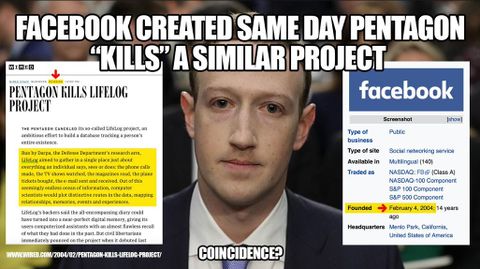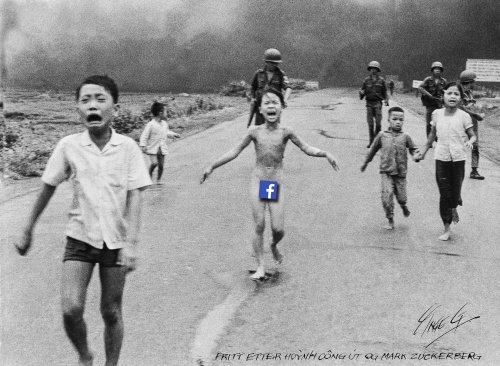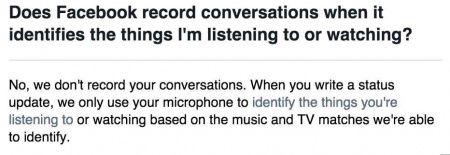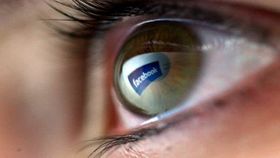(Big Tech, Universal surveillance, Social medium) | |
|---|---|
 | |
| Formation | February 4, 2004 |
| Founder | • • Eduardo Saverin • Andrew McCollum • Dustin Moskovitz • Chris Hughes |
| Headquarters | Menlo Park, California, US |
| Subgroups | • Instagram • Oculus VR • PrivateCore |
| Interests | Platformization |
| Interest of | Carole Cadwalladr, Frances Haugen, Project Veritas, Reclaim The Net |
| Owners | Mark Zuckerberg |
| Member of | Atlantic Council/Corporate Members, Centre for European Policy Studies/Corporate Members, Council on Foreign Relations/Corporate Members, European Policy Centre, First Draft, Friends of Europe, Transatlantic Policy Network, WEF/Strategic Partners |
| Sponsor of | Poynter Institute |
| Subpage | •Facebook/Censorship •Facebook/Oversight board |
| The world's most popular social network, with over 1,000,000,000 users in 2014. | |
Facebook is the world's most widely used social website. It has a great - and often poorly understood - ability to influence its users.[1] The first board member was Bilderberg/Steering committee member, Peter Thiel.[2]
Palantir CEO Alex Karp has asked people to consider "the value that facebook brings to society"[3].
George Soros has called Facebook a "menace to society" and a "near monopoly distributor" of information that should be regulated as a utility[4].
Contents
Origins
Facebook was officially founded on 4 February 2004, the same day that DARPA shut down the LifeLog universal surveillance project. The Facebook CEO was Mark Zuckerberg, at Harvard University.
The official narrative declares that Zuckerberg was a computer genius who coded the site himself. Another version has him as a front man for the US Deep state's DARPA-backed LifeLog project.
It stands to reason that data from Facebook feeds into projects like Sentient World Simulation or others of similar nature,[5][6] officially acknowledged or not. The initiative to predict behavior of populations goes back to counter insurgency planning after the second world war.[7][8]
Activities
Gatekeeping
WhoWhatWhy reports that gatekeeping is a common phenomenon in Facebook, as editors reported regular manual intervention to add or remove particular news stories from the 'trending' news feed.[9]
Influence on elections
In May 2018, Facebook established a partnership with the Atlantic Council, an influential Washington-based organization that "galvanizes US leadership and engagement in the world together with allies”. The specific purpose of the partnership is to guarantee “the correct use of Facebook in elections around the world, monitoring disinformation and foreign interference, helping to educate citizens and civil society”.[10]
Censorship
- Full article: Facebook/Censorship
- Full article: Facebook/Censorship
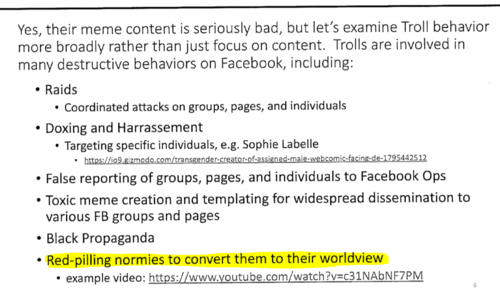
Facebook reported a 21% rise in takedown requests in the latter half of 2017, up from 64,279 to 78,890. The US accounts for 57% of all requests.[11]
"Fake News"
Mark Zuckerberg wrote in 2017 that "Right now, we're starting to explore ways to use AI to tell the difference between news stories about "terrorism" and actual terrorist propaganda so we can quickly remove anyone trying to use our services to recruit for a terrorist organization."[12] In 2019, Facebook complied with demands from the Singaporean government about labeling "fake news" as such.[13]
"Hate Speech"
On May 31, 2016, Facebook agreed with Google, Microsoft, and Twitter to a European Union code of conduct obligating them to review "[the] majority of valid notifications for removal of illegal hate speech" posted on their services within 24 hours.[14] In 2018, Breitbart News reported that "Britain’s police have stumbled into another public relations disaster after threatening to track down and prosecute Facebook users for ridiculing them."[15]
Frances Haugen
According to whistleblower Frances Haugen Facebook "harms children, stokes division and weakens our democracy".[16]
Mass surveillance
Facebook is recording a lot of data about a lot of people. Together with other social media, in 2016, Facebook "accounted for 43 percent of all traffic to major news sites. Nearly two-thirds of Facebook and Twitter users access their news through their feeds."[17] Hundreds of millions of Facebook profiles are reportedly for sale on the Dark Web.[18]
Data Harvesting
Brittany Kaiser, a staffer of Cambridge Analytica reported in April 2018 that over 87 million users' details were accessed by the company.[19]
Content moderation
A 2015 estimate put 1/3 of Facebook's entire staff as moderators, but Facebook claimed this was an overestimate - although without offering an alternative figure.[20]
The editor of Norway's largest newspaper found his Facebook feed censored after he posted the 1972 image of Kim Phúc running away from a US napalm attack. In an open letter to Mark Zuckerberg he complained that "First you create rules that don’t distinguish between child pornography and famous war photographs. Then you practice these rules without allowing space for good judgement. Finally you even censor criticism against and a discussion about the decision – and you punish the person who dares to voice criticism."[21]
Tracking of Users
Facebook admits to using the microphone to listen to users' environments, but has claimed that it does not record conversations.
Since 2012, Facebook has been "better understanding of our ecosystem" by encouraging users to report if their friends use the network under an assumed name.[2] Mark Zuckerberg has been consistent in his explanation of the plan to shareholders, a plan to be the middle-man in all personal communication.[22]
Documents leaked in 2019 suggested that "Facebook planned to spy on Android phone users, internal emails reveal".[23]
Edin Jusupovic revealed in July 2019 that he had detected "hidden codes" in photos downloaded from from the site, leading him to conclude that "Facebook is embedding tracking data inside photos you download".[24] In essence this is not different from North Koreas operating system Red Star OS,[25][26] which also changes metadata to track users and their connections to others offline.
Tracking of Non-users
In April 2015, after research bu Belgian privacy regulators, Facebook admitted that it was placing a cookie on "some" people's browsers, even if they were not Facebook users and had never visited the site. It claimed that this was due to a "bug".[27]
Advertising
Since 2012, Facebook has been buying sensitive data about users’ offline lives from data brokers and combining this information with the online data it collects in order to sell this information to advertisers.[28]
Research on users
Facebook is used as a research tool by ordinary users, but the company itself also carries out undisclosed research on users. An internal document leaked in 2017 showed how by monitoring posts, comments and interactions on the site, Facebook can figure out when people as young as 14 feel “defeated”, “overwhelmed”, “stressed”, “anxious”, “nervous”, “stupid”, “silly”, “useless”, and a “failure”.[29]
Facebook CEO Sheryl Sandberg reportedly ordered employees to conduct "research"[30] on Soros following his remarks on the company at the World Economic Forum in 2018 . [31]
Emotional Contagion
Multiple experimenters have used data from Facebook to study 'emotional contagion', how mood is transferred between friends. It was announced in 2014 that some research was not merely observational, but involved investigations in manipulating users' moods through the skewing of data presented through Facebook. For 7 days, 689,003 users were presented with modified newsfeeds which included more or less "happy" or "sad" phrases from friends. The study concluded "that emotional states can be transferred to others via emotional contagion, leading people to experience the same emotions without their awareness."[32]
Face recognition
Facebook announced in 2014 that it has developed a program called "DeepFace," which can determine whether two photographed faces are of the same person with 97.25% accuracy - compared with a human ability of discriminating faces at about 97.5%.[33]
Research by users
In 2014, Matt Honan, a journalist for Wired magazine notes the effects of an experiment he tried out - "liking" everything which Facebook served up to him for 48 hours.[34]
Factchecking
In July 2021, Facebook announced a partnership with Logically, a UK-based fact checker that uses artificial intelligence.[35]
Lawsuits
Since 2011, Max Schrems, an Austrian lawyer has repeatedly requested all information Facebook hold on him[36] arguing that under European law he was entitled to this. Multiple legal resubmissions later, on 2 December 2015, Schrems resubmitted his original complaint against Facebook with the Irish Data Protection Commissioner. He has set up a website at http://europe-v-facebook.org to promote his viewpoint.[37]
Funding the Integrity Initiative
The Integrity Initiative received £100,000 for research and education activities in 2018-2019. However, an essay from August 2018 on "Discernment" stated that “it seems every day we uncover information about how platforms like Facebook have used our personal data to target us with highly-tailored messaging that merges advertising for goods and services with political messages that reflect our interests and values through our online viewing reinforced by viewpoints we like and follow. This is exacerbated by a financial model that gives financial reward to content that is clicked and shared most widely.” [38]
Facebook on Wikispooks
References
- ↑ https://medium.com/@tristanharris/how-technology-hijacks-peoples-minds-from-a-magician-and-google-s-design-ethicist-56d62ef5edf3#.b4f6nhqo2
- ↑ a b http://www.digitaltrends.com/social-media/facebook-snitch-on-friends-that-arent-using-real-names/
- ↑ https://www.youtube.com/watch?v=NtyLvr0UH_M
- ↑ https://www.georgesoros.com/2018/01/25/remarks-delivered-at-the-world-economic-forum/
- ↑ https://www.nextgov.com/cio-briefing/2016/10/cia-can-predict-social-unrest-three-five-days-out/132102/
- ↑ https://sociable.co/technology/cia-siren-servers-social-uprisings/
- ↑ http://archive.today/2020.03.29-092345/https://en.wikipedia.org/wiki/Project_Camelot
- ↑ http://archive.today/2020.10.26-083404/http://eng.recentr.com/2020/09/project-camelot-could-predict-and-computer-simulate-uprisings/
- ↑ http://whowhatwhy.org/2016/05/10/internet-gatekeeper-evidence/
- ↑ https://www.globalresearch.ca/facebook-surrounds-africa/5716157
- ↑ http://www.theregister.co.uk/2017/12/19/facebook_who_needs_millennials_the_cops_love_us_more_than_ever/
- ↑ https://www.theregister.co.uk/2017/02/17/zuckerberg_publishes_worldsaving_manifesto/?page=2
- ↑ https://www.zdnet.com/article/facebook-issued-online-falsehoods-directive-after-singapore-site-fails-to-comply/
- ↑ https://www.theguardian.com/technology/2016/may/31/facebook-youtube-twitter-microsoft-eu-hate-speech-code
- ↑ http://www.breitbart.com/london/2018/05/12/british-police-threaten-to-prosecute-facebook-users-ridiculing-them/
- ↑ https://www.bbc.co.uk/news/world-us-canada-58805965
- ↑ http://www.theverge.com/2016/4/13/11387934/internet-moderator-history-youtube-facebook-reddit-censorship-free-speech
- ↑ https://fossbytes.com/267-million-facebook-accounts-sold-on-dark-web-for-500/
- ↑ http://www.theregister.co.uk/2018/04/17/former_cambridge_analytica_staffer_brittany_kaiser_dcms_committee_evidence/
- ↑ http://www.theverge.com/2016/4/13/11387934/internet-moderator-history-youtube-facebook-reddit-censorship-free-speech
- ↑ http://www.aftenposten.no/meninger/kommentar/Dear-Mark-I-am-writing-this-to-inform-you-that-I-shall-not-comply-with-your-requirement-to-remove-this-picture-604156b.html
- ↑ http://saintsal.com/facebook/
- ↑ https://www.computerweekly.com/news/252458208/Facebook-planned-to-spy-on-Android-phone-users-internal-emails-reveal
- ↑ https://www.forbes.com/sites/zakdoffman/2019/07/14/facebook-is-embedding-hidden-codes-to-track-all-your-uploaded-photos-report
- ↑ https://www.bbc.com/news/world-asia-35188570
- ↑ https://sofrep.com/news/north-koreas-computer-operating-system-includes-spy-tools/
- ↑ http://thehill.com/policy/technology/238399-facebook-claims-a-bug-made-it-track-people-not-on-facebook
- ↑ http://projectcensored.org/23-facebook-buys-sensitive-user-data-offer-marketers-targeted-advertising/
- ↑ http://www.news.com.au/technology/online/social/leaked-document-reveals-facebook-conducted-research-to-target-emotionally-vulnerable-and-insecure-youth/news-story/d256f850be6b1c8a21aec6e32dae16fd
- ↑ https://www.theguardian.com/technology/2018/nov/14/facebook-george-soros-pr-firm-discredit-critics-crisis
- ↑ https://www.straitstimes.com/world/united-states/facebook-coo-sheryl-sandberg-asked-for-info-on-billionaire-critic-george-soros
- ↑ http://www.theatlantic.com/technology/archive/2014/06/everything-we-know-about-facebooks-secret-mood-manipulation-experiment/373648/
- ↑ http://www.huffingtonpost.com/2014/03/18/facebook-deepface-facial-recognition_n_4985925.html
- ↑ http://www.wired.com/2014/08/i-liked-everything-i-saw-on-facebook-for-two-days-heres-what-it-did-to-me/
- ↑ https://www.logically.ai/press/logically-announces-uk-fact-checking-partnership-with-facebook
- ↑ https://www.forbes.com/sites/kashmirhill/2012/02/07/the-austrian-thorn-in-facebooks-side/
- ↑ http://europe-v-facebook.org
- ↑ Integrity Initiative/Leak/4 Discernment paper_BR2018_08.06_proposal2.pdf, 6 August 2018
